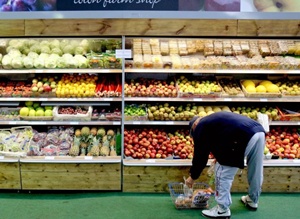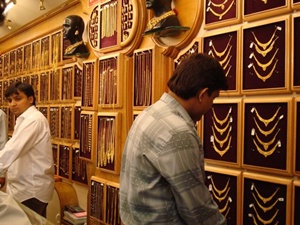Yukti Vidyarthi in Mumbai
The last few months have seen prices of practically all goods and commodities go through the roof. An impending drought, a failing crop, lack of supply to meet the rising demand. . . there has been many a reason thrown at us to justify the price rise.
That was when inflation was way below zero. Now, it has just poked its head into positive territory: meaning, prices could rise further. The government, meanwhile, says it is addressing the situation and taking measures to control runaway prices.
With prices of most essential commodities doubling in the last twelve months or so, Indian households have had to cut corners to make two ends meet. Even affluent classes have been taking it a bit easy. And with the festive season upon us, the customary warmth and cheer that pervade the nation seem to be palpably missing.
With most of the festivals (Navratri, Id, Dussehra, Diwali) knocking at the door, we spoke to a few people about how they planned to celebrate and what are they doing to cope with the soaring prices.
For Suruchi, a manager at an investment banking firm in Mumbai, monthly grocery bills have jumped to about Rs 6,000, compared to Rs 4,500 in the last several months.
She says that prices of vegetables, meat and bakery products have also risen in the last few months. The cost of sugar has almost doubled to Rs 35-40 per kg and pulses cost a whopping Rs 85-100 a kilo.
"Obviously, this would affect our Diwali celebrations," adds Suruchi. "Since the past several years we have been buying sweets as Diwali gifts for our relatives, colleagues and friends. Dry fruit sweets are the most expensive and I wonder what the prices would be this year," she shudders.
Soaring prices could affect festivities
For Amit and Meenu, a couple that bought a house last year in Mumbai and pays a hefty EMI (equated monthly installment) of Rs 40,000, Diwali 'celebrations' would largely mean compromising on a lot of things this year.
They say they hardly save anything at the end of the month, with essential commodity prices rising so high. And adding to their woes, their employers have kept increments on hold this year, blaming challenging market conditions and a global slowdown.
"It will be a quite Diwali for us this time," Meenu exclaims with sarcasm. "Sure, we will light up our house, but parties and get-togethers would be a no-no," she laments.
Unlike the past several years, when people would go shopping for goodies come festival time, this time around they are waiting for prices to come down or for some discount schemes before they finally go ahead with their expenditure for the coming festivals.
These factors have also affected the monthly savings of most Indian households. According to the Reserve Bank of India's annual report the gross financial savings of Indian households increased by a marginal 4.3 per cent in 2008-09 compared to 10.1 per cent in the preceding year.
Soaring prices could affect festivities
For Sandhya, who runs a tiffin service from home in Mumbai and has about 10 fixed customers each day, grocery bills have risen to about 20 per cent in the last two months. She says she had to make modifications in her menu to accommodate these costs.
"Every year we see retailers like Big Bazaar offering some really good schemes during festivals, but this year the schemes are nothing great, and I am still waiting to make my purchases for Navratri, which begins on Saturday (Sept 19). I am even planning to increase the price per tiffin, if the modifications don't help much," she adds.
With the prices of daily essentials rising, spending on sweets, clothes, crackers, lights and other celebrating items are taking a back seat.
Many of the customers are not able to resist a quick look at the jewellery despite the prices, but a large number also walk away promising to return as soon as prices ease.
With the marriage season approaching and gold prices at an all-time high of over Rs 16,000 per 10 gm, many are caught in a bind. For those who have a wedding at home there's hardly any choice but to buy the costly yellow: the fear is that the prices may shoot up further.
Dhanteras (a couple of days before Lakshmi Pujan) may see customers buying gold as Hindus consider it auspicious to purchase gold/ silver articles or utensils. It is believed that new 'dhan' or some form of precious metal is a sign of good luck.
"I don't plan to buy gold this time, may be a silver coin this year, that's it," says Daksha, a housewife.
People have become selective about their spending and are opting for cheaper purchases. Most families are slashing their shopping budgets to save up for financially uncertain times ahead.
Also, this festival season is the time when many think of buying a new vehicle, but people with a plan to buy a new car now have to rethink with not only car prices rising, but fuel costs too at a new high.
Yet, despite the tough times, Indians tend to lighten up during festivals and might show some willingness at loosening their purse strings this time too. If that happens, the markets could see some much-needed cheer.




article